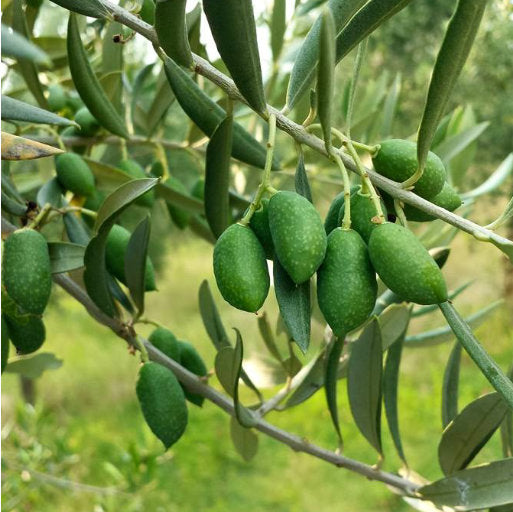Article: The Qualities of Irpinia Extra Virgin Olive Oil: A Treasure of the Campania Region

The Qualities of Irpinia Extra Virgin Olive Oil: A Treasure of the Campania Region
Irpinia, the green heart of Campania, is one of the most suitable areas for the production of high-quality extra virgin olive oil. Thanks to its geographical position, which embraces the mountains and the internal valleys of the region, Irpinia enjoys a favorable climate and soils rich in biodiversity, which contribute to the creation of an olive oil with unique characteristics. This article explores the peculiarities of Irpinia extra virgin olive oil, its production process, the local olive varieties, and the health benefits that this precious oil can offer.
Irpinia: An Ideal Territory for Olive Cultivation
Irpinia, located in the province of Avellino, is a region characterized by mountainous terrain, with altitudes ranging between 300 and 1,000 meters above sea level. This territory, crossed by valleys and rivers, enjoys a Mediterranean climate, but with cool temperatures thanks to its high altitude. These climatic conditions, together with the composition of the mineral-rich soils, create the ideal environment for the cultivation of high-quality olive trees.
Irpinia is one of the Italian areas that boasts the recognition of **Irpinia DOP Extra Virgin Olive Oil**, a protected origin mark that certifies the quality and authenticity of the product. The DOP (Protected Designation of Origin) guarantees that the oil comes exclusively from olives grown and processed in the Irpinia area, respecting strict quality standards at every stage of production.

The Olive Varieties of Irpinia
The variety of olives grown in Irpinia is very wide, but among the main ones stand out the **Olivella**, the **Ravece** and the **Frantoio**, all adapted to the particular climatic conditions of the region.
Ravece: It is the most representative variety of Irpinia and one of the most prized in Campania. Ravece is a native variety that stands out for its resistance to mountainous climates and for its late ripening, which usually occurs between October and November. The oil produced from this variety has a complex aromatic profile, with an intense fruity taste, a light bitterness and a balanced spiciness. Ravece gives the final product a good structure and a long persistence on the palate.
Frantoio: Although originally from Tuscany, the Frantoio variety is also very widespread in Irpinia, where it adapts perfectly to the characteristics of the territory. Frantoio oil has a delicate, fruity and slightly bitter flavor, with notes of green almond and a herbaceous aftertaste. This variety is appreciated for its balance between sweetness and spiciness.
Olivella: Less widespread than the Ravece, the Olivella is a typical variety of the area, known for its small olives and the oil it produces, with a delicate flavor and a good fruity component. This variety is ideal for giving softness and finesse to blended oils.
The Production Process: Tradition and Innovation
The quality of Irpinia extra virgin olive oil depends not only on the varieties of olives grown, but also on the production process that combines tradition and innovation. The olives are harvested manually or with the help of vibrating machines, which guarantee the selection of the healthiest and ripest fruits. It is essential that the olives are harvested by hand or with non-invasive systems to avoid the olives from suffering damage that could compromise the quality of the final product.
Once harvested, the olives are taken to the mill, where **cold pressing** takes place. This process involves crushing the olives without using heat that could compromise the quality and flavor of the oil. Cold pressing allows the polyphenols, antioxidants, and typical aromas of extra virgin olive oil to remain intact. The next phase is the **separation of the oil** by centrifugation, which takes place at low temperatures to best preserve all the organoleptic characteristics.
Another distinctive element of Irpinia oil is the use of modern extraction techniques, which combine with the traditional approach to guarantee a final product of excellence. The result is an extra virgin olive oil with a high quality, which preserves the organoleptic and nutritional properties thanks to its rigorous production method.
The Organoleptic Qualities of Irpinia Extra Virgin Olive Oil
The extra virgin olive oil from Irpinia stands out for its organoleptic characteristics. The quality of this oil is reflected in its taste, aroma and color:
Taste: Irpinia oil is known for its rich and complex flavor. It is an oil with an intense fruitiness, which can vary depending on the varieties used, but which in general is characterized by a well-balanced but decisive bitterness and spiciness. The bitter component is particularly evident in products obtained from the Ravece variety, giving the final product a robust structure.
Aroma: Irpinia oil has a herbaceous and fruity aroma, with hints of almond, green olive, and sometimes tomato. The intensity of the aromas can vary depending on the climatic conditions of the year and the variety of olives used.
Color: The oil is an intense green, with golden hues, typical of fresh, high-quality oils.
The Health Benefits of Irpinia Extra Virgin Olive Oil
The extra virgin olive oil from Irpinia, thanks to its high concentration of polyphenols, vitamin E and monounsaturated fatty acids, offers numerous health benefits:
Antioxidant Properties: Polyphenols present in extra virgin olive oil act as powerful antioxidants, protecting the body's cells from damage caused by free radicals. These compounds are known to reduce the risk of cardiovascular disease and cellular aging.
Cardiovascular Benefits: Extra virgin olive oil is a major source of monounsaturated fatty acids, which are associated with a reduced risk of heart disease. Regular use of extra virgin olive oil can help improve cholesterol levels, promoting "good" cholesterol (HDL) and reducing "bad" cholesterol (LDL).
Anti-Inflammatory Properties: Olive oil is also known for its anti-inflammatory properties, which can help reduce chronic inflammation, a major risk factor for many diseases, including diabetes and arthritis.
Protective Effects on the Nervous System: Recent studies suggest that extra virgin olive oil may have protective effects against neurodegenerative diseases, such as Alzheimer's, thanks to its antioxidant and anti-inflammatory properties.
Conclusions
Irpinia extra virgin olive oil represents an authentic treasure of the Campania agricultural and gastronomic tradition. Thanks to its unique organoleptic profile, rigorous production process and numerous health benefits, this oil confirms itself as one of Italy's food excellences. Its versatility in the kitchen and its health properties make it an ideal ally for a healthy and balanced diet, while its strong connection with the territory and its quality guaranteed by the DOP make Irpinia oil a safe and valuable choice for all lovers of good food.
Sources
- **Bertoldi, G., & Casella, S.** (2018). *Guide to Italian Oils 2018*. Gambero Rosso.
- **National Association of Oil Cities** (2020). *Extra Virgin Olive Oil DOP Irpinia



Leave a comment
This site is protected by hCaptcha and the hCaptcha Privacy Policy and Terms of Service apply.